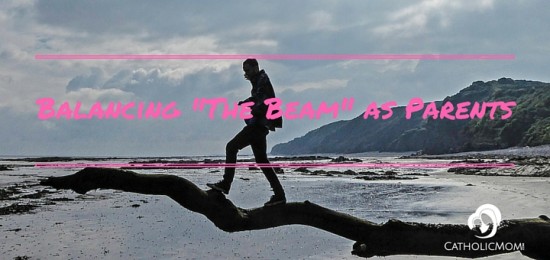Spoiler alert: tomorrow's gospel is a doozy.
Every time I run across this particular portion of the Sermon on the Mount at the start of Matthew's seventh chapter, it gives me pause. "Stop judging," Christ teaches us. The way we "measure" others is the way we will be measured--mercy for them gives us a greater hope for mercy ourselves.
And God knows I need all of the mercy I can get!
But when we get to that illustration in verses three, four and five, I really sit up and pay attention:
Why do you notice the splinter in your brother’s eye,
but do not perceive the wooden beam in your own eye?
How can you say to your brother,
‘Let me remove that splinter from your eye,’
while the wooden beam is in your eye?
You hypocrite, remove the wooden beam from your eye first;
then you will see clearly
to remove the splinter from your brother’s eye.”
It's one thing to make an effort to avoid being hypocritical, but how do we parents possibly live in the world but not be "of" the world? And how can we model an attitude of nonjudgmental behavior while still teaching our kids right from wrong?
[Tweet " How do we parents possibly live in the world but not be "of" the world?"]
Calling Out Our Mission Territories
While every family must determine for themselves the answers to these questions, it feels clear to me that part of the response in our home is clearly understanding, embracing, but also preparing ourselves for our "mission territory". Because we now live in urban Los Angeles, I find myself immersed in a culture that is vastly different than the one I've known the past two decades. Life has brought us here. And since we have prayed fervently for God's will to be done in our lives, I believe God has brought us here.
But being "here" so far has felt like a learning experience. All around me are not only people of different faiths and backgrounds, but also folks who are living in vastly disparate socioeconomic circumstances. I am quickly understanding that I cannot make assumptions about my new neighbors without getting to know them.
So to balance my own "beam", I am:
- Offering my days in prayer--I'm best prepared to offer mercy when I have begged for it myself at the start and end of my days.
- Attempting true interactions--however brief--with the folks I encounter--This means stowing my cell phone and being in the moment, whether the "moment" is happening in the elevator, in the grocery store line, or simply when I am walking down the street.
- Understanding the "rest of the story"--This actually means practicing active listening, asking questions, and attempting to find commonality. More often than not it also means just keeping my mouth shut.
- Avoiding the truly sinful--I have to be cognizant not only here in our new community, but really anywhere I go that it's my job to understand God's laws and to honor them with my choices. I have to be strong enough to say, "No" for myself but also not to degrade into judgmentalism when others make different choices. Rather than pontificating in these instances and engaging in hypocritical behavior, I need to learn to lovingly extricate myself from sinfully dangerous situations.
Parental Pointers
As challenging as all of this is for us personally, our role as parents and primary faith formators for our families extends our responsibility level when "balancing the beam". I won't hold myself up as any expert here, but want to share the following thoughts and hear your input:
- What do we do when we witness sinful behavior around us? In my case, I try to make a mental note immediately if I am with my children to have a conversation later (but not too much later) about the situation. This conversation obviously needs to happen on an age-appropriate level. But lovingly conversing with our kids when they witness true sin is part of our job as parents. We also have to avoid spinning into sin of our own by not gossiping, casting false or inaccurate aspersions, or assuming facts not in our possession.
- How can the sacrament of reconciliation help us to remove the "beam" from our own eye? Availing ourselves of the confessional after an examination of conscience can truly help us avoid future "near occasions of sin". In its commentary on the eighth commandment, the Catechism of the Catholic Church states, "Truth as uprightness in human action and speech is called truthfulness, sincerity, or candor. Truth or truthfulness is the virtue which consists in showing oneself true in deeds and truthful in words, and in guarding against duplicity, dissimulation, and hypocrisy." (2468) As always, if we "perceive the beam" in our own eye after sin has been committed, we should seek out penance. Teaching our children to love the confessional is a gift of mercy we can bestow with our words, but perhaps most responsibly by our example.
I'd love to hear your thoughts on this topic. Please chime in below in the combox and share with me how you address topics that raise "red flags" for you with your children and how you teach them in a non-hypocritical way.
Copyright 2016 Lisa M. Hendey
photo credit: Log Walker via photopin (license)
About the Author

Lisa M. Hendey
Lisa M. Hendey is the founder of CatholicMom.com, a bestselling author and an international speaker. A frequent radio and television guest, Hendey travels internationally giving workshops on faith, family, and communications. Visit Lisa at LisaHendey.com, on her Substack at LisaHendey.Substack.com, or on social media @LisaHendey for information on her speaking schedule or to invite her to visit your group, parish, school or organization. Find Lisa’s books on her Amazon author page.



.png?width=1806&height=731&name=CatholicMom_hcfm_logo1_pos_871c_2728c%20(002).png)
Comments